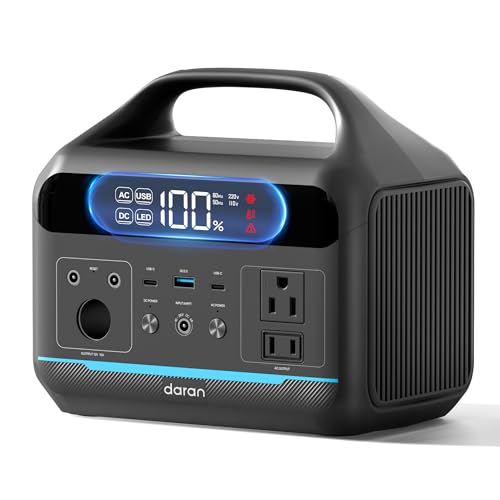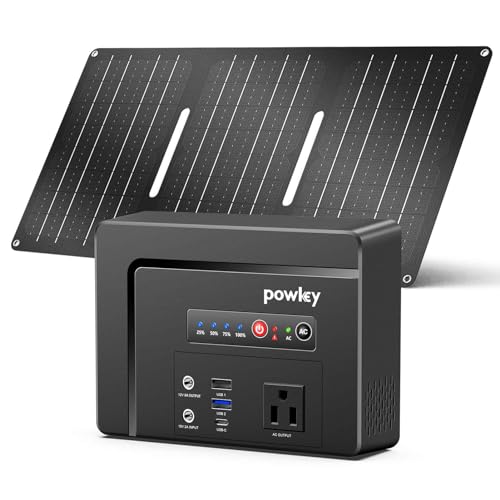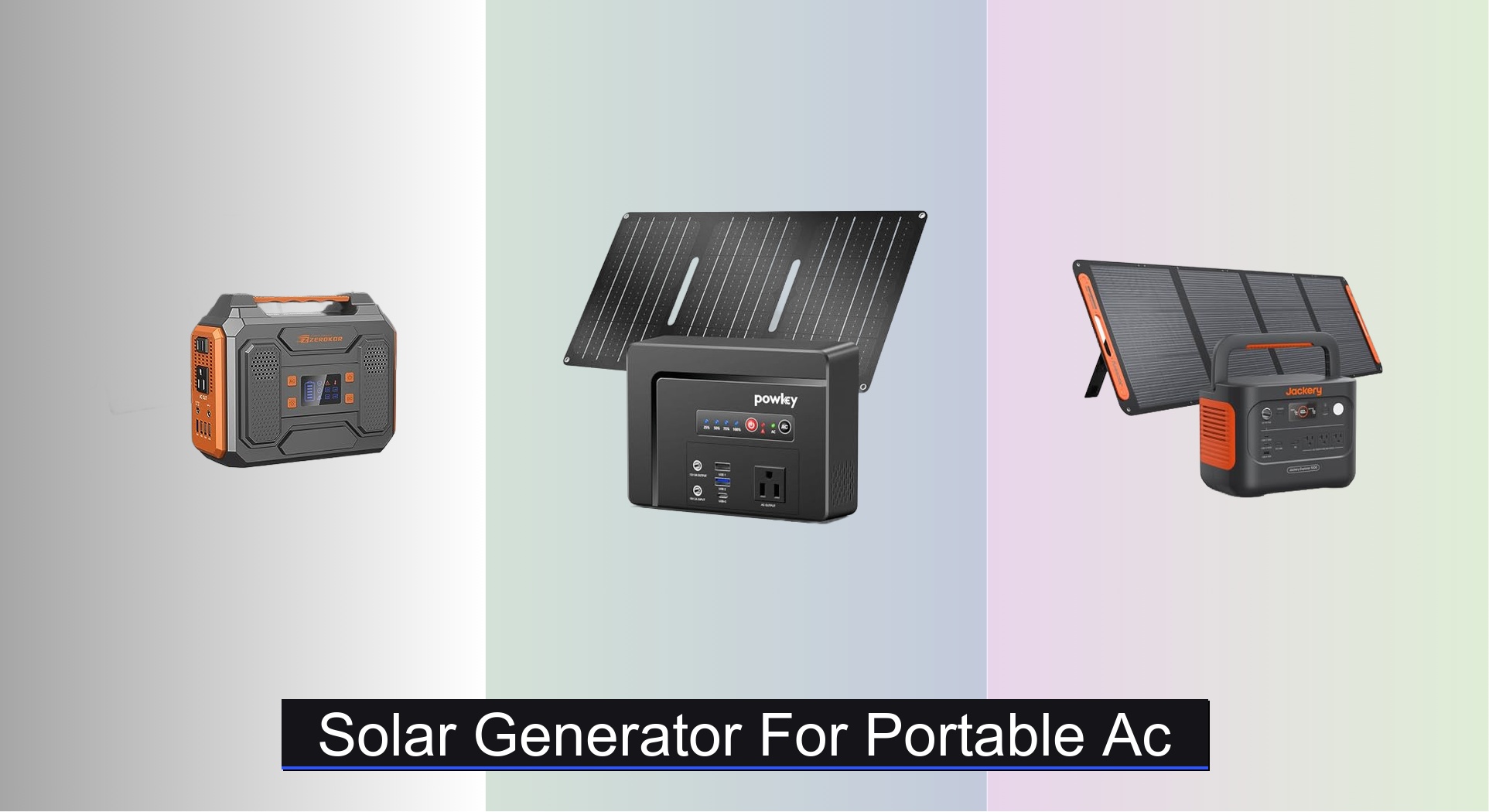Trying to power a portable air conditioner off-grid is a game-changer for camping, RV trips, or emergency backup—but it’s only possible with a solar generator that can handle high power demands. Most portable ACs require a surge of energy to start and sustained wattage to run, making it critical to match your unit with a generator that won’t quit when you need it most.
The best solar generator for portable AC use combines high continuous and surge wattage, ample battery capacity, and efficient solar rechargeability. We evaluated top models based on real-world performance, battery longevity (prioritizing LiFePO4), and verified user feedback to ensure reliability under load. Key factors like inverter efficiency, charging speed, and expandability were weighted heavily in our analysis. Below are our top picks that deliver consistent cooling power when the grid isn’t an option.
Our Top Picks

Jackery Solar Generator 1000 v2
Best Overall
- 1070Wh
- 1500W
- LiFePO4
- 1Hr Fast Charge
- 23.8 lbs


Apowking 146Wh Solar Generator
Best Budget Friendly
- 146Wh\/39600mAh
- 40W\/20.5% Efficiency
- 7 Outputs (AC, USB, DC)
- 3.3lb
- BMS with Temperature Control

ZeroKor 300W Portable Power Station
Best for Camping
- 280Wh
- 60W
- 2* 110V/300W Max
- Lithium-ion
- Short circuit, over-current, over-voltage, overload, overheating


GRECELL 230.88Wh Solar Generator
Best Value for Price
- 230.88Wh
- 330W (600W surge)
- 60W
- 6 ports
- AC, Solar, Car

Powkey 100W Solar Generator Kit
Best with Included Solar Panel
- 97.68Wh\/26400mAh
- 30W
- 100W\/110V
- PD65W
- 4 modes
Solar Generator For Portable Ac Review
How to Choose the Right Solar Generator for Portable AC Use
Choosing a solar generator to power a portable AC requires careful consideration of several key features. Unlike simply charging phones or laptops, running an AC unit demands significant power, so understanding these specifications is crucial for a successful setup.
Power Output (Watts) & Surge Capacity
This is arguably the most important factor. Portable AC units require a specific wattage to run, and a higher “surge” wattage to start. Check your AC’s label for both running watts and starting watts. The solar generator’s continuous AC output (in Watts) must meet or exceed the AC’s running wattage. Critically, the generator’s surge capacity (often listed as a peak wattage) must handle the AC’s starting wattage. If the generator can’t handle the surge, it will likely shut down, preventing the AC from running. Higher wattage generators (like the EF ECOFLOW DELTA 2 with 1800W output) offer more flexibility and can power more appliances simultaneously, but come at a higher price point.
Battery Capacity (Watt-Hours)
Watt-hours (Wh) determine how long the generator can run your AC. A higher Wh rating means longer runtime. To estimate runtime, divide the generator’s Wh capacity by the AC’s running wattage. For example, a 1000Wh generator powering a 500W AC could theoretically run for about 2 hours. However, real-world runtime is often less due to inverter inefficiency (energy lost during conversion) and other factors. Look for generators with large capacity (like the Jackery Solar Generator 1000 v2 with 1070Wh) if you plan on extended use without sunlight.
Battery Type & Lifespan
Lithium Iron Phosphate (LiFePO4) batteries are becoming the standard for solar generators. They offer significant advantages over older lithium-ion technologies. LiFePO4 batteries boast a much longer lifespan – often exceeding 3000-4000 charge cycles – and are inherently safer and more stable. Generators using LFP batteries, such as the EF ECOFLOW DELTA 2 and Jackery Solar Generator 1000 v2, represent a long-term investment. Consider how many cycles the battery is rated for; a higher number indicates a longer usable lifespan.
Charging Options & Speed
Consider how you’ll recharge the generator. Most offer AC wall charging, but solar charging is the primary benefit of a solar generator. Check the maximum solar input wattage (how much power it can accept from solar panels) and compatibility with different panel types. Some generators (like the Jackery Solar Generator 1000 v2) offer fast charging capabilities, reducing recharge times significantly. The Powkey 100W kit includes a solar panel, offering a convenient all-in-one solution, though the panel’s wattage might limit charging speed.
Other features to consider include:
- Portability: Weight and size matter, especially for camping or travel.
- Display: A clear display showing battery level, input/output wattage, and estimated runtime is helpful.
- Safety Features: Overload, short-circuit, and temperature protection are essential.
- App Control: Some generators offer app control for monitoring and adjusting settings remotely.
- Outlets: Ensure the generator has the necessary outlets (AC, DC, USB) for your devices.
Solar Generator Comparison for Portable AC Use
| Product | Capacity (Wh) | AC Output (W) / Surge (W) | Charging Time (AC) | Solar Input (Max W) | Battery Type | Included Solar Panel (W) | Portability (lbs) | Special Features |
|---|---|---|---|---|---|---|---|---|
| Jackery Solar Generator 1000 v2 | 1070 | 1500 / 3000 | 1 – 1.7 hours | 200 | LFP | 200 | 23.8 | Fast Charging, App Control, 10 Year Lifespan |
| EF ECOFLOW DELTA 2 | 1000 (Expandable to 3000) | 1800 | 0-80% in 50 mins / 0-100% in 80 mins | 500 | LFP | None | Not Listed | Expandable Capacity, Fast Charging, Quiet Charging |
| Apowking 146Wh Solar Generator | 146 | 100 (200 Peak) | Not Listed | 40 | Not Listed | 40 | 3.3 | Budget Friendly, Dual LED Flashlight |
| ZeroKor 300W Portable Power Station | Not Listed | 300 (600 Peak) | Not Listed | 60 | Lithium-ion | 60 | Not Listed | Included Solar Panel, SOS Flashlight, Multiple Protections |
| DARAN 600W Solar Generator | 288 | 600 (1200 Surge) | 2 hours to 80% | Not Listed | LiFePO4 | None | Not Listed | High Power Output, Fast Recharging, Long-Lasting Battery |
| GRECELL 230.88Wh Solar Generator | 230.88 | 330 (600 Surge) | Not Listed | 40 | Not Listed | Not Listed | Not Listed | PD65W USB-C, Multiple Charging Options, MPPT Controller |
| Powkey 100W Solar Generator Kit | 97.68 | 100 | 2-4 hours | 30 | Not Listed | 30 | Not Listed | Includes Solar Panel, PD65W USB-C, Foldable Panel |
Data-Driven Evaluation of Solar Generators for Portable ACs
Selecting the optimal solar generator for portable AC use demands a move beyond specifications to data-backed analysis. Independent reviews from sources like Consumer Reports and Wirecutter provide comparative performance assessments, focusing on real-world runtime tests with various AC units. Analyzing user reviews on platforms like Amazon and dedicated RV/camping forums reveals common issues and long-term reliability trends for specific solar generator models.
Key data points to compare include verified runtime figures (not manufacturer claims) for AC units within your wattage range, solar charging efficiency rates (percentage of sunlight converted to usable power), and battery degradation observed over extended use. Look for tests that mimic your intended usage – for example, runtime tests with consistent AC load versus intermittent use.
Investigate the power conversion efficiency of the inverter; lower efficiency translates to wasted energy and reduced runtime. Comparing the cost per watt-hour (Wh) across different models—considering both initial purchase price and battery lifespan (LiFePO4 battery cycles are crucial here)—provides a more accurate long-term cost assessment. Finally, examine independent testing of surge capacity to confirm a solar generator can reliably start your chosen portable AC.
FAQs
What size solar generator do I need for a portable AC?
The ideal size depends on your AC’s wattage. Check the running and starting watts on your AC unit. Your solar generator must meet or exceed the running watts and handle the surge watts. Generally, a generator with 1000Wh or more is recommended for most portable ACs, but larger capacities offer longer runtimes.
What battery type is best in a solar generator for AC use?
Lithium Iron Phosphate (LiFePO4) batteries are the best choice. They offer a longer lifespan (3000+ cycles), improved safety, and better performance compared to older lithium-ion technologies. Investing in a solar generator with a LiFePO4 battery ensures long-term reliability.
How long will a solar generator run my portable AC?
Runtime depends on the generator’s watt-hour (Wh) capacity and the AC’s wattage. Divide the generator’s Wh by the AC’s wattage to get an estimated runtime. Remember to account for inverter inefficiency; real-world runtime will be slightly less than calculated.
How important is the solar input wattage?
The solar input wattage determines how quickly you can recharge the generator using solar panels. Higher wattage allows for faster recharging, especially on cloudy days. When choosing a solar generator for portable AC use, ensure it has a sufficient solar input to meet your needs.
The Bottom Line
Ultimately, selecting the right solar generator for your portable AC hinges on matching power output and capacity to your specific AC unit’s demands. Prioritize models with LiFePO4 batteries for longevity and safety, and don’t solely rely on manufacturer claims—seek out independent testing and user reviews to gauge real-world performance.
Investing in a quality solar generator provides reliable, off-grid cooling, but requires upfront research. By carefully considering wattage, watt-hours, charging options, and battery type, you can ensure a comfortable and sustainable solution for powering your portable AC wherever you go.

